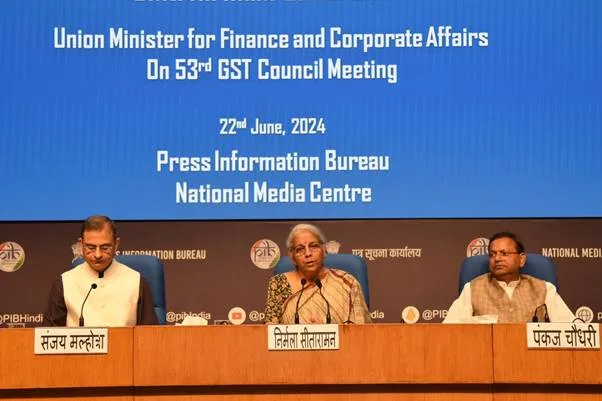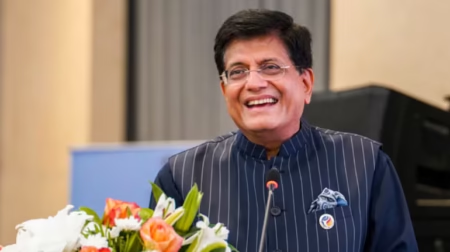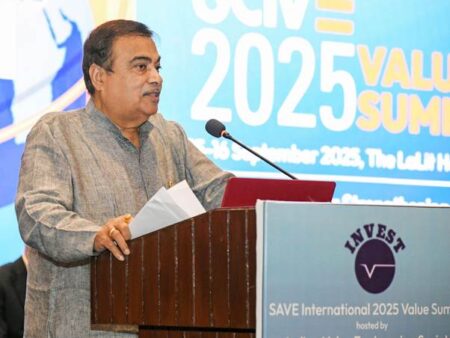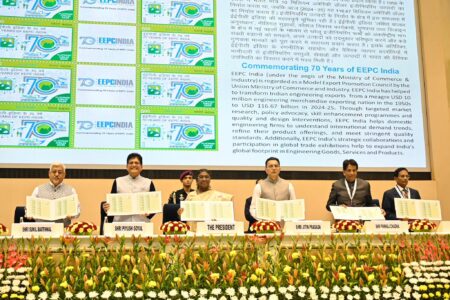Key GST rate changes and compliance measures recommended

The 53rd GST Council met under the Chairpersonship of Union Minister for Finance & Corporate Affairs Nirmala Sitharaman in New Delhi. The meeting was also attended by Union Minister of State for Finance Pankaj Chaudhary, Chief Ministers of Goa and Meghalaya; Deputy Chief Ministers of Bihar, Haryana, Madhya Pradesh, and Odisha; besides Finance Ministers of States & UTs (with legislature) and senior officers of the Ministry of Finance & States/ UTs.
The GST Council inter alia made the following recommendations relating to changes in GST tax rates, measures for facilitation of trade and measures for streamlining compliances in GST.
Changes in GST rates on goods
The GST Council recommended various changes to GST rates on goods to enhance clarity and support specific sectors. A uniform 5 percent IGST rate will now apply to imports of aircraft parts, components, and testing equipment. Milk cans will attract a 12 percent GST, regardless of material or use. The GST rate for cartons, boxes, and cases made of paper has been reduced from 18 percent to 12 percent. Solar cookers will also be taxed at 12 percent, and the definition of poultry keeping machinery has been expanded to include its parts. All types of sprinklers will attract 12 percent GST. Exemptions from IGST for imports for defense forces and research equipment under the RAMA program have been extended, as well as compensation cess exemptions for imports in SEZs and for Unit Run Canteens supplying to authorised customers.
Changes in GST rates on services
Exemptions have been granted for certain services provided by Indian Railways, including platform ticket sales and cloakroom services. SPV services used by Indian Railways during the concession period and maintenance services by Indian Railways to SPV are also exempt. Accommodation services under ₹20,000 per month, provided for a continuous period of at least 90 days, are exempt. Additionally, co-insurance and reinsurance transactions, certain insurance schemes, and statutory collections by RERA have received specific clarifications and exemptions to reduce ambiguities.
Measures for facilitation of trade
- Waiver of Interest and Penalties
Section 128A will be inserted into the CGST Act to waive interest and penalties for fiscal years 2017-18 to 2019-20, provided the full tax is paid by March 31, 2025. This does not cover erroneous refunds.
- Reduction in Government Litigation
Monetary limits for filing appeals by the department have been set: ₹20 lakhs for GSTAT, ₹1 crore for High Court, and ₹2 crores for the Supreme Court. Pre-deposit requirements for filing appeals have been reduced to ease taxpayers’ financial burden.
- Exclusion of Extra Neutral Alcohol (ENA) from GST
ENA used for manufacturing alcoholic beverages will be explicitly excluded from GST, ensuring no levy on this substance when used in alcohol production.
- Reduction of TCS Rate for ECOs
The TCS rate collected by Electronic Commerce Operators has been reduced from 1 percent to 0.5 percent to ease the financial burden on suppliers.
- Other Procedural Amendments
Amendments in various sections and rules have been recommended, such as changing the due date for GSTR-4 filing from April 30 to June 30, adjusting interest calculations, and providing a mechanism for refund claims. Provisions have been clarified for transactions involving related parties and import services valuation. Additionally, annual return filing exemptions for small taxpayers and changes to the handling of anti-profiteering cases were proposed.
Legal and Procedural Clarifications
Numerous clarifications were issued on GST applicability, valuation, and ITC availability. These include taxability of employee stock options, reversal of ITC on life insurance premiums, warranty services, motor vehicle insurance claims, loans between related parties, and time of supply for specific projects. Further, measures to combat fraudulent ITC claims through biometric Aadhaar authentication were proposed, along with a common time limit for issuing demand notices and orders.
Miscellaneous Changes
Adjustments to transitional credits, new facilities for amending GSTR-1, and changes in reporting thresholds for B2C inter-state supplies were also recommended. The Council emphasised the need for a streamlined and clear GST framework to reduce litigation and support compliance.











